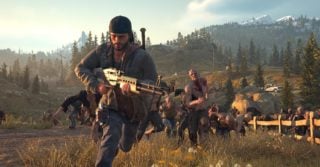Ex-PlayStation boss says games should be shorter because development costs are ‘not sustainable’
“What would Coppola do if you walked out halfway through his movie?” Shaun Layden asks

Former PlayStation executive Shawn Layden says the price of game development has reached an unsustainable point, and games should be made shorter to remedy this.
In an interview with Eurogamer, Layden was asked if it was enough to keep selling games to an audience that isn’t growing at a rapid rate.
Layden acknowledged that the industry is currently about “getting more money off the same people”, and suggested that until this changed game development costs had to come down.
“Every generation it costs twice as much to build a game,” he explained. “What costs $1 million on PS1, then costs $2 million, then $4 million, then $16 million. It goes exponentially.
“[During] the PS4 generation, which was the last I was associated with, game dev was $150 million if you want to be top of the line, and that’s before marketing. So by that math, PS5 games should eventually reach $300 million to $400 million, and that is just outright not sustainable.”
He added: “It’s like we’re at the end of the 18th century, and we’re realising that building cathedrals is really expensive. Can we continue to build these massive edifices to God for this incredible amount of labour and time? Or should we just build four walls and a roof, and that’s a church, right?
“I’m afraid we’ve built AAA gaming into a kind of cathedral business, and it just can’t grow any further. In fact, it’s probably grown too far already.”

Asked how this trend could be rolled back to something more sustainable, Layden replied that “games are too long”, suggesting that while the length of a game used to be one of its main selling points, as the average audience has aged a long game has become less of an attractive prospect to some players.
“For the longest time, we kept banging on about ‘100 hours of gameplay’. ‘This is going to be awesome. It’s 100 hours of gameplay,’ like that’s the most important thing to know,” he explained.
“That was a metric in the early years, when the average gamer was 18 to 23. And when you’re 18 to 23, you’re time rich and money poor.
“But as the average age of the gamer moved into the late 20s, the early 30s – well, it’s the opposite, right? Maybe you aren’t money rich, but you’re definitely time poor. So I think our approach is a mismatch to that market, to reality.”
Layden also suggested that the constant chase for intricate levels of detail ramp up production costs, and that if games are too long and players don’t reach the end, that results in a lot of resources spent on content few actually get to see.
“On PS1, our expectation walking down the street in a game was that you couldn’t open every door,” he said. “Now the expectation is you can go in every house, open every drawer and everything is destructible. And that’s nice, but it’s expensive to make that happen. We have to look at that.
“If only 50 percent of players see the end of your game, what about all those millions you spend on the final level, for only half the people to see it? There’s so much money being put into making huge game experiences and people aren’t seeing it. What would Coppola do if you walked out halfway through his movie?
“We have to understand – is this a good use of resources? I want a movement that gets more people to finish games, where we make it so compelling they just want to see it, and where it’s not so onerous they don’t have to spend three months doing it.”















